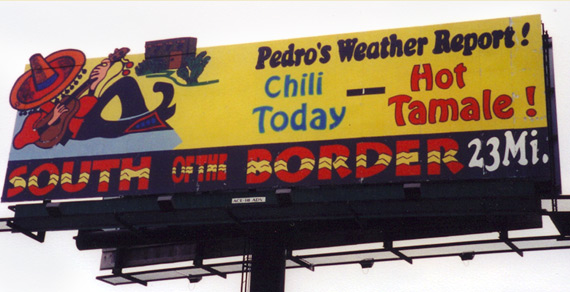“A sound heart is life to the body, But envy is rottenness to the bones.” PR 14:30
“South of the Border” signs were everywhere. I was nine the first time our family traveled the East Coast corridor down to Florida from Vermont. Hundreds of miles before crossing from North to South Carolina, distinct and colorful billboards dotted I-95 of this faux-Mexican tourist trap. The sheer volume of these comical posts stirred my curiosity and etched on my memory. Who was “Pedro”? This place is crazy, it must be fun! Oh how I wished we could have checked it out! What a brilliant idea.
Holy Spirit loves to strew our paths with “signs” to get our attention. Although there are times when I get instant perspective, downloads or neon blasts of understanding on subjects, He most often woos me, line upon line, step by step, into grasping something once beyond me. For the past several weeks the Heavenly Highlighter has marked up the pages of my pilgrimage on the subject of envy. Wow. How could something so consequential have remained in the shadows for so long?
Bob Sorge has written a wonderful yet frightening book on Envy, which he calls “the most underrated weapon in Satan’s arsenal”. You see, envy is a bone-level sin. It’s deep, embedded, and when left unchecked it’s a universal contaminator. Consider James 3:16:
“For where envy and self-seeking exist, confusion and every evil (vile) thing are there.”
Wherever envy takes roots in a life, the fruits are bitter, contentious, and rank. Sorge defines envy as “the painful or resentful awareness of an advantage enjoyed by another joined with a desire to posses the same advantage.” Whereas its cousin jealousy says “I want what you have”, envy spouts “I must have it”, then adds “and I’m going to make sure you don’t!” This resolve can become obsessive, aggressive, even violent.
That’s why envy’s partners in scripture are not your garden variety types. It’s aligned with “self-seeking”, “strife”, “hatred”, even “murder”. Yes, murder. Consider envy’s inaugural appearance in the Bible: the story of the first siblings in history. A rivalry had been seething between Cain and Abel. Scripture vividly portrays sin as “crouching” like a predator at the door—lurking, seeking just the right opportunity to spring into the room and devour. Although God said to Cain, you must subdue, master, and rule over it, he failed. The result: the fire of envy in his belly erupted as untethered rage. He struck and killed Abel.
Solomon the Wise “observed all the work and ambition motivated by envy” (Ecc 4:4 MSG), identifying it as a subterranean and pernicious force against normal, healthy interactions. When unbridled, envy becomes aligned with dark, beastly spirits that stir up and energize some of our basest human emotions. These are the spirits that infected the Jewish leaders to hand Jesus over to be crucified. Why? “Because of envy” (Mk 15:10). James doesn’t mince words about what he calls “bitter envy” either, branding it as “earthly, sensual, demonic” (Jam 3:14,15). The King James Version says “devilish”. Touché!
Paul, too, vigilantly resisted envy’s entry into his life, stating in 2 Cor 10:12 “we do not dare to classify or compare ourselves” with others. He recognized comparing his gifts, achievements, or progress with others can be the first stage on the slippery slope to becoming competitive, to intensifying rivalry, to antagonism, before plummeting into all-out discord and enmity. He was determined to subdue and master this crouching foe, before it was too late. We’d be wise to do the same.
Beloved, as we set our hearts and hopes upon revival, one of the clearest antecedents is unity. Until we uncover and deal with envy’s subterfuge, the very thing we seek may remain…buried beneath Pedro’s sombrero, somewhere South of the Border.
